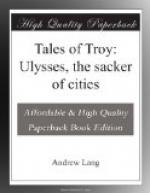We cannot believe that he ran away, and the story goes on to tell that he asked Achilles to make an agreement with him. The conqueror in the fight should give back the body of the fallen to be buried by his friends, but should keep his armour. But Achilles said that he could make no agreement with Hector, and threw his spear, which flew over Hector’s shoulder. Then Hector threw his spear, but it could not pierce the shield which the God had made for Achilles. Hector had no other spear, and Achilles had one, so Hector cried, “Let me not die without honour!” and drew his sword, and rushed at Achilles, who sprang to meet him, but before Hector could come within a sword-stroke Achilles had sent his spear clean through the neck of Hector. He fell in the dust and Achilles said, “Dogs and birds shall tear your flesh unburied.” With his dying breath Hector prayed him to take gold from Priam, and give back his body to be burned in Troy. But Achilles said, “Hound! would that I could bring myself to carve and eat thy raw flesh, but dogs shall devour it, even if thy father offered me thy weight in gold.” With his last words Hector prophesied and said, “Remember me in the day when Paris shall slay thee in the Scaean gate.” Then his brave soul went to the land of the Dead, which the Greeks called Hades. To that land Ulysses sailed while he was still a living man, as the story tells later.
Then Achilles did a dreadful deed; he slit the feet of dead Hector from heel to ankle, and thrust thongs through, and bound him by the thongs to his chariot and trailed the body in the dust. All the women of Troy who were on the walls raised a shriek, and Hector’s wife, Andromache, heard the sound. She had been in an inner room of her house, weaving a purple web, and embroidering flowers on it, and she was calling her bower maidens to make ready a bath for Hector when he should come back tired from battle. But when she heard the cry from the wall she trembled, and the shuttle with which she was weaving fell from her hands. “Surely I heard the cry of my husband’s mother,” she said, and she bade two of her maidens come with her to see why the people lamented.
She ran swiftly, and reached the battlements, and thence she saw her dear husband’s body being whirled through the dust towards the ships, behind the chariot of Achilles. Then night came over her eyes and she fainted. But when she returned to herself she cried out that now none would defend her little boy, and other children would push him away from feasts, saying, “Out with you; no father of thine is at our table,” and his father, Hector, would lie naked at the ships, unclad, unburned, unlamented. To be unburned and unburied was thought the greatest of misfortunes, because the dead man unburned could not go into the House of Hades, God of the Dead, but must always wander, alone and comfortless, in the dark borderland between the dead and the living.




